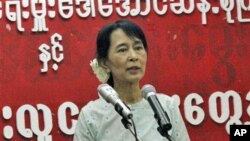Burma’s opposition National League for Democracy has called for talks with Western nations about possible changes to sanctions against the country. Sanctions have been in place since the 1990s to penalize Burma’s military government for its human rights record.
The opposition group led by Burma’s pro-democracy icon Aung San Suu Kyi on Tuesday called for discussions with the United States, the European Union and other governments to determine "when, how and in what circumstances sanctions may be modified".
The Association of Southeast Asian Nations backs the lifting of the sanctions, which range from an arms embargo to trade bans. Burma is a member of ASEAN.
Some regional analysts say the sanctions have choked economic growth and pushed Burma’s military closer to China. Beijing has ignored the sanctions to gain business concessions in the resource-rich but impoverished country.
But Maung Zarni, a research fellow at the London School of Economics, says the sanctions are not the cause of poverty in Burma.
"It’s not the economic sanctions that are hurting the Burmese people in terms of their livelihood. It is the Burmese junta that refuses to acknowledge that economic reforms and other reforms are desperately needed if the country is to move forward," he said.
Various sanctions have been imposed on Burma over several years as a way to pressure its military rulers to make human rights and political reforms. The U.S. arms embargo against Burma started in 1993, while that of the European Union in 1996. In 2003, the U.S. banned direct imports from Burma such as timber and gems, and restricted financial transactions with the country.
However, Burma continues to trade with and attract investments from China, India and its Southeast Asian neighbors.
Aung San Suu Kyi and the NLD have in the past endorsed the sanctions, but have indicated they could rethink that position. However, the party’s statement Tuesday said sanctions should not be lifted until the government frees more than 2,000 political prisoners.
Kurt Campbell, U.S. assistant secretary of state for East Asia, said last week it is premature for the U.S. to lift its sanctions. He said the U.S. wants to see more concrete reforms from the Burmese government.
Maung Zarni says the sanctions pose the "last obstacle" for the junta to gain international legitimacy. But he says the military is unlikely to undertake reforms to get rid of them.
"Whether or not they are accepted by the Burmese domestic public, they no longer care and they want to be accepted by the international community without needing to do the improvements in both the economic and human rights conditions," he said.
The NLD won elections in 1990 but was never allowed to take power. The NLD and Aung San Suu Kyi have no formal political roles in Burma after the group boycotted the November parliamentary elections, because of elections laws the party considered unfair. The NLD has been officially disbanded as a political party.
The military and its allies control the new parliament.
Aung San Suu Kyi’s Group Calls for Talks to Review Burma Sanctions













